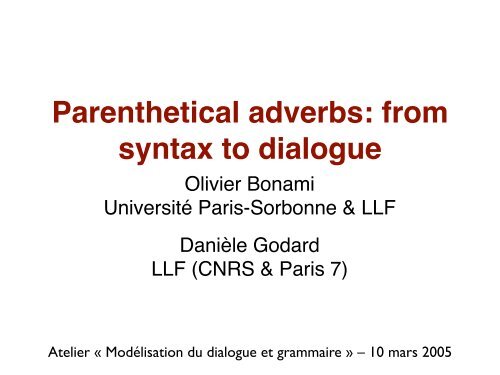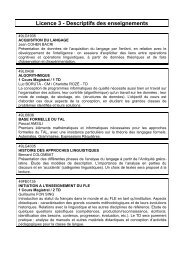Parenthetical adverbs: from syntax to dialogue
Parenthetical adverbs: from syntax to dialogue
Parenthetical adverbs: from syntax to dialogue
Create successful ePaper yourself
Turn your PDF publications into a flip-book with our unique Google optimized e-Paper software.
<strong>Parenthetical</strong> <strong>adverbs</strong>: <strong>from</strong><strong>syntax</strong> <strong>to</strong> <strong>dialogue</strong>Olivier BonamiUniversité Paris-Sorbonne & LLFDanièle GodardLLF (CNRS & Paris 7)Atelier « Modélisation du <strong>dialogue</strong> et grammaire » – 10 mars 2005
Overview• <strong>Parenthetical</strong> <strong>adverbs</strong>: heureusement ‘fortunately’,honnêtement ‘honestly’, etc.• Intuitively: they are not part of “what is said”, “themain semantic content”, “the asserted proposition”,etc.• Four issues:• Relation between parentheticality and in<strong>to</strong>nation• Pragmatic status of parentheticals• Semantic types for parentheticals• <strong>Parenthetical</strong>s at the <strong>syntax</strong>-semantics interface2
1.1 <strong>Parenthetical</strong>s vs. incidentalsIncidentality and parentheticality are independentproperties :(1) a. Malheureusement,unfortunatelyidiot.idiotPaulPauls’SEestiscomportébehaved‘Unfortunately, Paul behaved like an idiot.’commelikeb. Paul s’ est malheureusement comporté comme un idiot.(2) a. Lentement,slowlylatherivèreriveramorçaitstartedsaitsdécrue.decrease‘Slowly, the river was dropping in level.’b. La rivière amorçait lentement sa décrue.unan3
1.2 Varieties of parentheticals• Speech act <strong>adverbs</strong>: honnêtement ‘honestly’, etc.• Provide a comment on the manner in which the mainspeech act was executed.• Connectives: donc ‘therefore, so’, etc.• Specify how the current speech act (and/or its content)relates with the current discourse.• Agentives (a.k.a. ‘subject-oriented’): gentiment ‘kindly’, etc.• Comment on an agent’s attitude in bringing about acertain state of affairs.• Evaluatives: heureusement ‘fortunately’, etc.• Provide a comment on the speaker’s appreciation of thesemantic content.4
2 The pragmatic status of evaluative <strong>adverbs</strong>• Evaluative <strong>adverbs</strong>…• are not part of the ‘main content’ (2.1)• are not presupposed (2.2)• differ <strong>from</strong> evaluative adjectives (2.3)• have a special status in <strong>dialogue</strong> (2.4)• can be assumed by the speaker or another agent(2.5)5
2.1 Not part of the main content(8) Si Paul va, malheureusement, voir Marie, elle sera furieuse.‘If, unfortunately, Paul goes and sees Marie, she will be furious.’⇔Si Paul va voir Marie, elle sera furieuse.‘If Paul goes and sees Marie, she will be furious.’(9) Qui est bizarrement arrivé à l’heure ?asks: who arrived on time?commits the speaker <strong>to</strong>: if somebody arrived on time, that’sweird.6
2.2 Not presupposed• Not contested in the same way as presuppositions(15) A: Paul a malheureusement perdu l’élection.‘Paul unfortunately lost the election.’B: # C’est faux, je trouve que c’est une très bonne nouvelle.‘That’s not true, I think it is very good news’.B: C’est vrai, mais moi, je trouve que c’est une très bonnenouvelle !‘Yes, but I personally think it is great news!’(16) A: Paul regrette d’être venu.‘Paul regrets that he came.’B: # Oui, mais Paul n’est pas venu !‘Yes (he would have regretted that), but Paul did not come!’7
2.3 Evaluative <strong>adverbs</strong> vs. adjectives• Adjectives, but not <strong>adverbs</strong>, presuppose their arg.(18) a. S’il est malheureux que Paul ait vu Marie, il est tragiquequ’il l’ait insultée.qu’il l’ait insultée.‘If, it is unfortunate that Paul met Marie, it is tragic thathe insulted her.’⇒ ‘Paulhe met insulted Marie.’ her.’(18) a. S’il est malheureux que Paul ait vu Marie, il es‘If, it is unfortunate that Paul met Marie, it is t⇒ ‘Paul met Marie.’(13) a. Si Paul va, malheureusement, voir Marie, elle sera furieuse.‘If, unfortunately, Paul meets Marie, she will be furious.’⇏ ‘Paul meets Marie.’(13) a. Si Paul va, malheureusement, voir Marie, elle se‘If, unfortunately, Paul meets Marie, she will be⇏ ‘Paul meets Marie.’Proposed relationship between adverb and adjective:(20) unfortunately ≡ λp.[p → unfortunate(p)]8
2.4 Status in <strong>dialogue</strong>• Evaluatives are “solitary commitments” of the speaker(21)⎡Participant’s gameboard⎤ ⎡update when asserting⎤pSPKR-CMT SSPKR-CMT {p} ∪ S⎢⎣ADDR-CMTA ⎥⎦ ❀ ⎢⎣ADDR-CMTA ⎥⎦QUDQQUD 〈p?〉 ⊕ Q(24) Participant’s gameboard update when uttering malheureusementp⎡⎤ ⎡⎤SPKR-CMT SSPKR-CMT {p,unfortunately(p)} ∪ S⎢⎣ADDR-CMTA ⎥⎦ ❀ ⎢⎣ADDR-CMTA⎥⎦QUDQQUD 〈p?〉 ⊕ Q9
2.5 Who is responsible for the evaluation?• By default, the evalua<strong>to</strong>r is the speaker.• In reported speech contexts, it can be anotheragent.(26) Marie m’a annoncé que, malheureusement pour moi, je n’avaispas été élu. Je lui ai expliqué que cela m’arrangeait plutôt, vuque je n’avais jamais eu l’intention de prendre le poste.“Marie announced that, unfortunately for me, I hadn’t beenelected. I explained that it was fine with me, since I neverintended <strong>to</strong> accept the position.”• Not surprising: a speech report can report allaspects of the illocutionary situation.• We need a unified way <strong>to</strong> talk about evaluatives10
2.5 Who is responsible for the evaluation?• Not convenient <strong>to</strong> model explicitly reported speechas gameboard updates.• Proposed grammatrical encoding: speechpredicates are ternary relations.(28)⎡Grammatical encoding of gameboard update instructions⎤assertive-utterance[[] ]⎢CONTEXTC-INDICES SPEAKER 1⎥⎣CONTENT “assert ( 1, p, { unfortunately(p) }) ⎦”• The assert relation will be interpreted as agameboard update instruction.11
3.1 The puzzle• The scope of the evaluative depends on its position(29) a. Malheureusement, Paul a soumis son résumé le 20 janvier.asserts: Paul submitted his abstract on January 20.commits the speaker <strong>to</strong>: It is unfortunate that Paul submittedhis abstract on January 20.b. Le 20 janvier, Paul a malheureusement soumis son résumé.asserts: Paul submitted his abstract on January 20.commits the speaker <strong>to</strong>: It is unfortunate that Paul submittedhis abstract (whatever the date).(30) a. Probablement, Marie est malheureusement venue.asserts: Marie probably came.12
. Le 20 janvier, Paul a malheureusement soumis son résumé.3.1 The puzzleasserts: Paul submitted his abstract on January 20.commits the speaker <strong>to</strong>: It is unfortunate that Paul submittedhis abstract (whatever the date).• The scope of the evaluative depends on its position(30) a. Probablement, Marie est malheureusement venue.asserts: Marie probably came.commits the speaker <strong>to</strong>: If Marie came indeed, it is unfortunatethat she did.b. Malheureusement, Marie est probablement venue.asserts: Marie probably came.commits the speaker <strong>to</strong>: it is unfortunate that Marie probablycame.13
3.2.1 MRS(32) Every student reads a book01 : every(x)234 : student(x)6 : a(y)!0 : every(x)2 : student(x) 3 : a(y)7 : book(y) 8 : read(x, y)0 : a(y)79 : book(y)5 : read(x, y)87 : book(y) 8 : every(x)2 : student(x) 3 : read(x, y)14
3.2.2 MRS in the grammar(38) a. Souvent, Paul invite un collègue.‘Paul often invites a colleague.’00 : often1 : a(x)6 : a(x)b.23 : colleague(x)4!2 : colleague(x) 4 : invite(paul, x)5 : often0 : a(x)62 : colleague(x) 4 : often7 : invite(paul, x)6 : invite(paul, x)• Disregarding incidentals, <strong>adverbs</strong> in the VP scope <strong>from</strong> left <strong>to</strong> right.15
• Disregarding incidentals, <strong>adverbs</strong> in the VP scope <strong>from</strong> left <strong>to</strong>6 : invite7 : invite(paul, x)3.2.3 MRS for <strong>adverbs</strong> in French(39) a. Paul invitera probablement souvent un collègue.•‘Paul will probably often invite a colleague.’French postverbal <strong>adverbs</strong> scope left <strong>to</strong> right.b. *Paul invitera souvent probablement un collègue.• Disregarding incidentals, <strong>adverbs</strong> in the VP scope <strong>from</strong> left <strong>to</strong> ri(39) a. Paul invitera probablement souvent un collègue.(1) (41) ‘Paul MRSwill for (0a): probably often invite a colleague.’b. *Paul invitera souvent probablement un collègue.05 : probably(1) (41) MRS for (0a):1 : a(x)065 : probably21 : a(x)37 : often64 : colleague(x)2387 : often4 : colleague(x)a. Resolutions:9 : invite(paul, x)816
1 : a(x)3.2.3 French <strong>adverbs</strong> in HPSG•2Disregarding 3incidentals, <strong>adverbs</strong> in the VP scope <strong>from</strong> left <strong>to</strong> ri• French postverbal <strong>adverbs</strong> scope left <strong>to</strong> right.4 : colleague(x)a. Resolutions:76: invite(paul, x)7 : often8(39) a. Paul invitera probablement souvent un collègue.‘Paul will probably 9 : invite(paul, oftenx)invite a colleague.’b. *Paul invitera souvent probablement un collègue.(1) (41) MRS for (0a):0 : probably0 : probably0 : a(x)6 : invite6 : often06 : a(x)5 : probably2 : colleague(x) 3 : probably8 : a(x)1 : a(x)2 : colleague(x) 3 : invite(paul, x)232 : colleague(x) 3 : often68 : invite(paul, x)7 : often6 : often8 : invite(paul, x)4 : colleague(x)817
• Problem: this cannot be done in standard MRS, because3.3.1 CONTENT.roblem: <strong>Parenthetical</strong>s: this cannot be done in the standard issue MRS, because come(paul) occursONTENT.CONTENT “assert 1 ,come(paul), unfortunately(come(paul)) ”• This The seems argument <strong>to</strong> be of the an evaluative exception is <strong>to</strong> also “resource part of sensitivity” the main icussed semantic by (Potts, content. 2003, pp. 111–115)This is a violation of “resource sensitivity”.• Simple solution: take MRSs <strong>to</strong> be Directed Acyclic Graphs,• Our solution: we take MRSs <strong>to</strong> be DAGs, not trees.(43) Marie says: Malheureusement, Paul est venu.his seems <strong>to</strong> be an exception <strong>to</strong> “resource sensitivity” in semantic composussed by (Potts, 2003, pp. 111–115)imple solution: take MRSs <strong>to</strong> be Directed Acyclic Graphs, instead of trees.Marie says: Malheureusement, Paul est venu.0 : assert(marie)0 : assert(marie){. . . }1 2 : unfortunately{. . . }1 2 : unfortunately34 : come(paul)3!0 : assert(marie)!1 : come(paul)0 : assert(marie){2 : unfortunately }1 : come(paul)18{
3.3.2 Scoping evaluatives3.3.2 Scoping evaluativesScoping evaluatives(44) Marie says: Malheureusement, Paul est probablement venu.Marie says: Malheureusement, Paul est probablement venu.1 : assert(marie)1 : assert(marie){. . . }{. . . }2 3 : unfortunately2 3 : unfortunately45 : probably645 : probably6!1 : assert(marie)!2 : probably6 : come(paul)1 : assert(marie)2 : probably6 : come(paul){3 : u{3 : unfortunately }7 : come(paul)7 : come(paul)Marie says: Probablement, Paul est malheureusement venu.19
5 : probably3.3.2 Scoping evaluatives667 : come(paul)(45) Marie says: Probablement, Paul est malheureusement venu.7 : come(paul)1 : assert(marie)2 {. . . }3 : probably 5 : unfortunately4 67 : come(paul)!2 : probably1 : ass20{4 : com(46) Marie says: Si, malheureusement, Paul est en retard, Jean sera1 : assert(marie)2 : probably6 : come(paul)Marie says: Probablement, Paul est malheureusement venu.1 : assert(marie)2 {. . . }3 : probably 5 : unfortunately4 67 : come(paul)!2 : probably1 : assert(marie){5 : unfortunately }4 : come(paul)Marie says: Si, malheureusement, Paul est en retard, Jean sera furieux.1 : assert(marie){. . . }1 : assert(marie)
3.3.2 Scoping evaluatives• Other things that work:• Other kinds of parenthetical <strong>adverbs</strong> (at leastagentives)• Sentences with multiple parentheticals• <strong>Parenthetical</strong>s embedded within parentheticals• Quantifiers inside parentheticals• Quantifiers scoping below parentheticals21
3.3.2 • <strong>Parenthetical</strong>s Scoping inevaluativesspeech reports:(52) Paul a dit que, malheureusement, Jean viendrait.‘Paul said that, unfortunately, Jean would come.’1 : assert(marie)1 : assert(marie)!2 : say(paul){}{4 : unfortunately }2 {. . . }5 : come(jean)3 : say(paul) 4 : unfortunately5 {. . . } 67 : come(jean)!131 : assert(marie)2 : say(paul) {}{4 : unfortunately }5 : come(jean)22
Conclusions• Evaluatives• are just like other <strong>adverbs</strong> as far as their argument isconcerned• get scoped in an unusual place• Another argument for representing explicitlyillocutionary relations in the semantics• (As usual) logical form turns out <strong>to</strong> be quite useful whenwe take the <strong>syntax</strong>-semantics interface seriously23




